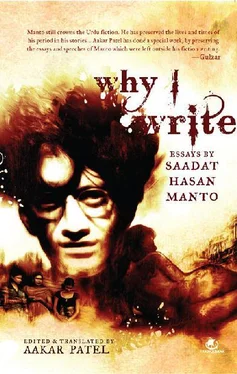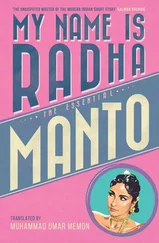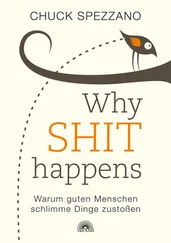Saadat Hasan Manto
Why I Write: Essays
Introduction. Why Read Saadat Hasan Manto?
Saadat Hasan Manto was an Indian trapped in Pakistan. This was his misfortune, and it was ours too. His identity didn’t come from religion and it came only partially from geography. It came mainly from his belonging to our culture, about which he wrote with great skill.
He reluctantly fled his beloved Bombay at Partition, complaining all the time against M A Jinnah’s stupidity, but worried for the safety of his three little girls. His observations of Mahim and Bhendi Bazaar, while the city was at its most violent, have been reproduced in these pieces. We can no more blame him for going than we can our grandfathers for staying.
Manto was not particularly educated, and had dropped out of Aligarh Muslim University after being an indifferent student. From a migrant Kashmiri family, he lived in Amritsar in those days, and came to Bombay after his father’s death to make a career as a journalist. Sleeping in the office of the paper he worked for, he got occasional work writing scripts for Bollywood (which wasn’t known by that name then).
As a writer of films, he was not very good. Certainly he was not successful. There are no great hits to his name, and in fact the big-budget movie that he wrote on debut was, he tells us, a flop. However, his charisma attracted some of film industry’s most powerful people, such as Ashok Kumar, to him. While only in his twenties when he was a junior writer, many of them attended his wedding in Mahim. Legends connected to the industry, such as the journalist Baburao Patel, were fond of Manto and helped him along in his career possibly because they suspected he had a hidden talent.
This talent was for producing his magical short stories. It made him the Maupassant of India. The liberal environment of British Bombay and its mixing of many cultures produced the fertile material that Manto needed for his writing, particularly his short fiction, but also his essays. His outstanding skill was for grasping Indianness. Stories like Bu , about a man in a flat who seduces a peasant woman and is intoxicated by the aroma of her armpit, represent for many the high watermark of Hindustani writing. It is difficult to think of better literature in our languages than his. This is the reason why, in his dismissal of Indians writing in languages other than English, Salman Rushdie made Manto the exception.
Living and working in Bombay was the happiest phase of Manto’s life. If it had not been for Partition, he would have lived and worked here till he died. But he recognized the viciousness that had been unleashed, and though he disliked it and was dismayed by it, he surrendered to its inevitability.
Manto accepts the fault and the culpability of his co-religionists first. This is something very few of us can still do in the subcontinent.
Anyway, it isn’t surprising that he left Bombay, given his young family and the barbarism of those days, but the story of why he didn’t return remains a mystery.
He died in Lahore at forty-two, having written the best critique of the creation of Pakistan and the lunacy of the puritanical State. A couple of pieces in this collection show how far- and clear-sighted he was about what the future would bring to a nation created in the name of religion.
One thing that emerged from Manto’s migration was his transformation as a writer. The playfulness of Bombay was gone. His darkest pieces, and some absurdist ones, were written in the new country. Often, it is said, he scribbled pieces standing up in newspaper and magazine offices, taking his money in cash and being driven off in a tonga to get his fix of alcohol. Manto is thought to have drunk himself to death. However, in his writing one can find references only to beer, and his consumption of it during his years in Bombay was moderate. In fact only a bottle a day, as he reveals in the wonderful essay on his wedding. In another of his pieces, My Fifth Trial (Part II) or Paanchvan Muqaddama (II), he refers to downing fifteen bottles of beer on a train journey along with a companion, but he brandishes the figure as a threat to fellow passengers.
Manto is seen as a Pakistani writer because he wrote in Nastaliq, now a foreign script in India but the standard one then used by Punjabis and even in Hindi cinema of the Forties. Those who have read him in the original, or even heard his words recited by Naseeruddin Shah’s magnificent troupe which performs his works, will know Manto’s language as that of Bollywood: simple and plain Hindustani. He is an easy man to translate in that sense.
He is a great Indian writer, who wrote in an Indian language to an Indian audience about his Indian experiences. This is why he should be read in any language he can be accessed in. Most of these pieces were written for newspapers, and except for two, so far as I know, none have been translated before. I have edited, clipped, trimmed and rewritten a few of them, perhaps more than I should have. For this, Manto will forgive me.
In his lovely flat in Lahore’s Lakshmi Mansion, which was given to him as refugee property, Saadat Hasan Manto wrote his pieces trying to scratch out a living. In this one he answers a question many writers are asked: how do you write? The Paris Review magazine has a section in which it asks writers to explain the way in which they go about their work. Manto was never interviewed in such a fashion, but here he attempts to tell us anyway. The flat he writes about, I visited many years ago. One of his daughters, Nighat, still lives there with her husband, Bashir Patel.
Ladies and gentlemen, I’ve been asked to say how it is that I write. Now I don’t really understand the question and what “how” means. My dictionary informs me it means “in what manner?”
What can I say about this?
The best way of putting it is to say, well, I sit on a sofa in my living room, pile up a sheaf of paper, unscrew the cap of my fountain pen and begin to write.
My three little daughters play in the same room. I chat with them every so often. I settle their quarrels, sometimes while I’m tossing a salad for myself. Should someone drop in, I play host and chat with them too. But through all of this, I continue to write.
Now if I were to be asked WHY is it that I write, I have an answer for that too.
The most important reason is that I’m addicted to writing, just as I am to drinking. When I don’t write, it feels like I’m unclothed, like I haven’t had a bath. Like I haven’t had my first drink.
I don’t actually write the stories, mind you, they write themselves. And that shouldn’t be surprising. You see, I haven’t had much education. I have, however, written twenty books and I’m often astonished at the thought of who their writer could possibly be. Clearly, important enough a man to be taken to court so regularly for obscenity.
When the fountain pen is not in my hand, I’m merely Saadat Hasan. A man who knows and is able to express little. It is the pen that transforms me into Manto.
The story I’m working on is never on my mind or in my thoughts. It is always in my pocket, unnoticed. I keep exerting my mind so that it might squeeze out the opening paragraphs. But to no avail.
I try to “be” a writer of stories, putting on the air of one and holding the right pose. I light one cigarette after another. But nothing comes out.
In the end I tire and lie down like a spent woman, exhausted from the exertion of unwritten stories. Then I get up and do other things. I feed the sparrows, take the trash out and play with my little girls. Their shoes, those tiny shoes dispersed about the house, I collect and put in their place.
Читать дальше












